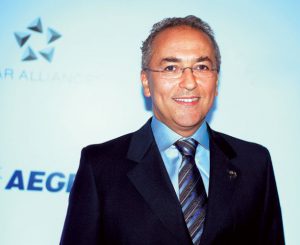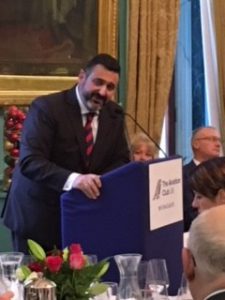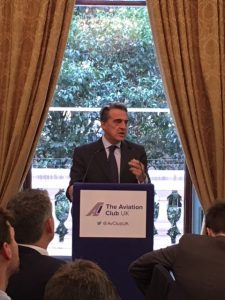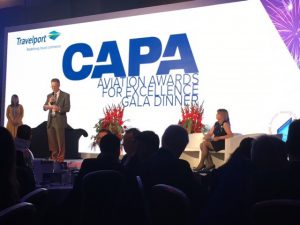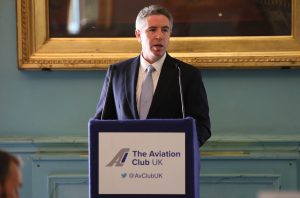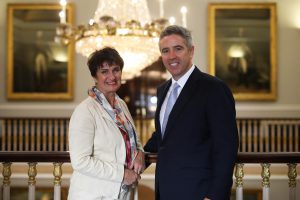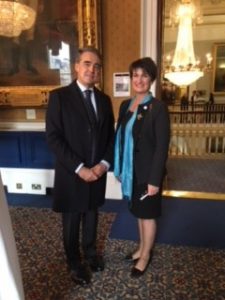
UK Aviation Priorities: Clarity on Brexit and Expanding Heathrow
8 November 2017 (London) – The International Air Transport Association (IATA) urged the UK Government to shore-up its international air connectivity by focusing on a cost-effective expansion of Heathrow Airport and achieving early clarity on post-Brexit issues.
Brexit
“In building the post-Brexit world, the prosperity of the UK will depend on the strength of its connectivity—links with Europe and the rest of the world,” said Alexandre de Juniac, IATA’s Director General and CEO, in an address to the UK Aviation Club.
“There is a real challenge ahead. When the UK leaves the European Single Market, it will also leave the European Common Aviation Area. And when it breaks from the European Union, all traffic rights to the rest of the world associated with Europe will also be thrown into question. The basis of international aviation is bilateral air services agreements. There is no WTO agreement to fall back on. For that reason, I don’t see any alternative to a negotiated agreement,” said de Juniac.
IATA urged an early resolution for aviation in the Brexit discussion. “Time is precious. The Brexit clock is ticking towards a deadline of March 2019. But the aviation deadline is earlier. Normally passengers can book travel about a year in advance. At a minimum, the flight schedules and seat and cargo inventories must be available at least six months in advance. So that puts the airlines’ deadline at October 2018—just 11 months from now,” said de Juniac.
“My message to all involved is threefold: Get started. Don’t step backward—people will not accept anything that turns back the clock on the achievements of the EU Common Aviation Area. And, lastly, don’t underestimate the amount of work ahead as there are intense political and commercial interests at stake,” said de Juniac.
While much attention has been paid to air service agreements, IATA urged action across a broad spectrum of issues including:
- Finding staffing, systems and process solutions for a potential ballooning of customs transactions from 4.6 million/month to 21 million/month.
- Developing immigration solutions to efficiently deal with the millions of travellers between the UK and Europe should border control procedures become more cumbersome.
- Defining the relationship of the UK to the European Aviation Safety Agency (EASA)
“The pressure is mounting, with passenger numbers predicted to grow irrespective of Brexit. Solutions need to be found quickly to ensure a smooth transition. With the amount of work that needs to be done, there are good arguments to put transition agreements in place,” said de Juniac.
Expanding Heathrow
IATA urged the UK government to address severe capacity constraints in the Southeast of the UK by expanding Heathrow airport. “Heathrow is where expansion should take place. I know the struggle to build a third runway has meant decades of frustration. But the UK will be left behind in the globally connected world if it does not come to a final decision and implement it,” said de Juniac.
The UK Department for Transport’s Draft National Policy Statement notes that a third runway at Heathrow will create GBP 200 billion in economic value and support up to 110,000 jobs. “Expanding Heathrow is about building prosperity. It should be a priority for the UK. And facing the post-Brexit world makes it even more urgent,” said de Juniac.
IATA, however, cautioned that the cost of expanding Heathrow needs to support its future competitiveness. “I am not saying to build the third runway at any cost. The original estimates of GBP 17 billion were completely unacceptable. Heathrow Airport’s recently announced intention to reduce that cost is a step in the right direction. Heathrow is already the most expensive airport in the world from which to operate. It is essential that Heathrow’s charges do not rise from today’s levels. The construction of the third runway must enhance Heathrow’s competitiveness, not destroy it!” said de Juniac.
A successful airport needs sufficient capacity and quality, aligned with airline operational needs and costs that are affordable. “In delivering the third runway, Heathrow’s capacity issue will be resolved for now. But achieving the right quality at the correct price requires consultation with the airlines. And one idea from the airline community that should be taken into consideration by the government is seeking competitive bids from developers,” said de Juniac.
CLICK HERE to see full text of de Juniac’s address or visit the IATA website .
